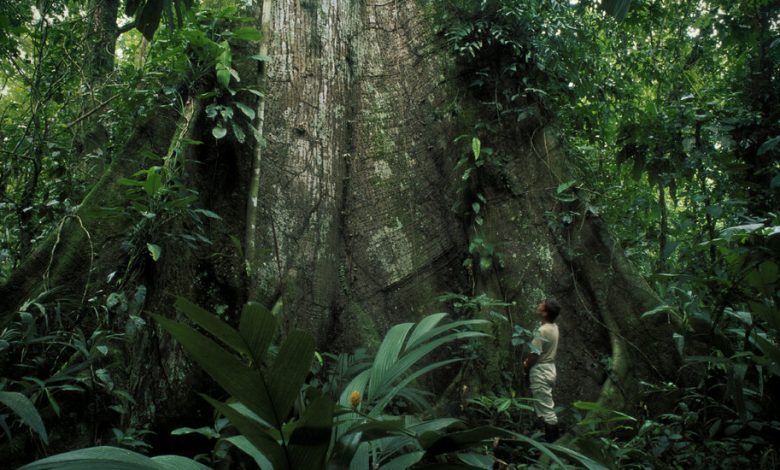My Community Doesn’t Exist Just to Absolve You of Your Climate Sins

In my community in southern Costa Rica, the Ceiba tree is sacred. It towers above all other trees in our forests, with a canopy that can grow as high as 230 feet.
My people, the Bribri, have always looked at our Ceibas with awe and respect. Rich nations now look at them and see an opportunity to atone for their climate sins. After decades and decades of fossil fuel use, they can now buy into carbon credit markets, paying communities like mine to keep tropical forests safe. We use the money to, for example, hire rangers who can patrol the edges of our lands and guard against illegal logging, mining and farming operations, thus preventing the deforestation that is a major source of climate-warming emissions.
Companies that have their own pledges to cut their emissions can also join in on these markets. They direct large sums of money through brokerage firms that often use the role of Indigenous people as a selling point.
At the United Nations climate conference in Sharm el Sheikh, Egypt, last month, one of the most contentious debates was around fair rules for the new carbon trading system that is expected to start in 2024 as part of the Paris climate agreement.
But the negotiations failed to create any new rules and safeguards, leaving in place a system in which Indigenous communities can easily be — and already are being — exploited. Of particular concern is a provision that allows countries to keep information about carbon credit projects confidential. That’s why going forward the U.N. body that will oversee carbon markets must require that any proposal for partnering with Indigenous people begins with recognition of our land rights, transparency about project details and a consultation process with communities — the only guarantee that our forests will remain standing.
The current lack of regulation and clear rules has given rise to carbon cowboys — brokers who have descended on Indigenous communities in Honduras, Brazil and Colombia and talked them into signing away their rights to the carbon in their forests, and in turn the payments that can come with them.
At their worst, carbon cowboys are companies and individuals who set their own rules, forging agreements with Indigenous people that undermine land rights and deny communities the right to give (or deny) their consent to participate in the carbon credit market.
The international community has called for “high integrity” carbon markets that both reduce emissions and protect against exploitation. But that is possible only when the people who have deep spiritual and cultural links to the forest are directly involved.
Even brokers that proclaim their high ethical standards often come up short on actual protections. LEAF Coalition is a public-private initiative that has received more than $1.5 billion from corporations like H&M, Volkswagen, Amazon, Unilever and BlackRock. LEAF says it ensures “the highest levels of environmental integrity and social safeguards, particularly for Indigenous peoples and local communities.” But in practice, it offers no discernible guarantees for Indigenous rights on the ground.
Environmental integrity is embedded in Indigenous languages and passed down from one generation to the next. It is rooted in our sense of place by culture, custom and spirituality. It is fundamental to our identity. We are the eyes and the ears on the ground, and we know if the forest is being threatened. We are the key to ensuring that the carbon stays here in the forest.
Carbon credit brokers have said that the speed of climate change doesn’t allow for us to be part of the consultation process. But we can’t be just observers and commentators if it has anything to do with our forest. We need a seat at the table.
Our elders, women and youth want to understand what is being proposed. It may not happen as quickly as these brokers would like. But these new relationships between the richest corporations in the world and poor communities like mine must also be about participation, rights and cultural knowledge. The common goal should not be about covering up environmental sins but rather finding solutions to the climate problem we face together.
Levi Sucre Romero is a member of the Bribri Indigenous peoples of Costa Rica and the coordinator of the Mesoamerican Alliance of People and Forests.
The Times is committed to publishing a diversity of letters to the editor. We’d like to hear what you think about this or any of our articles. Here are some tips. And here’s our email: [email protected].
Follow The New York Times Opinion section on Facebook, Twitter (@NYTopinion) and Instagram.